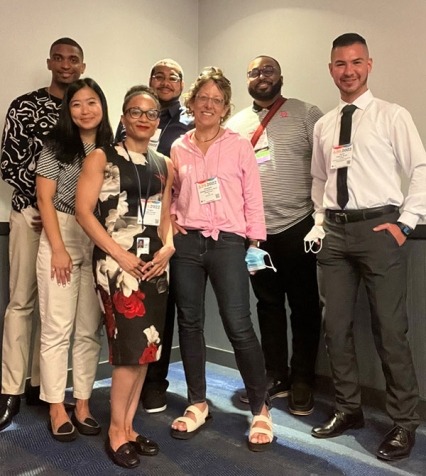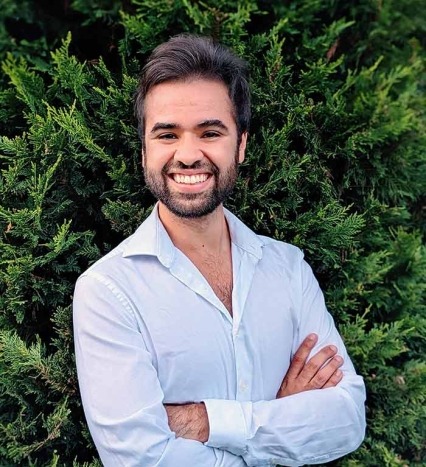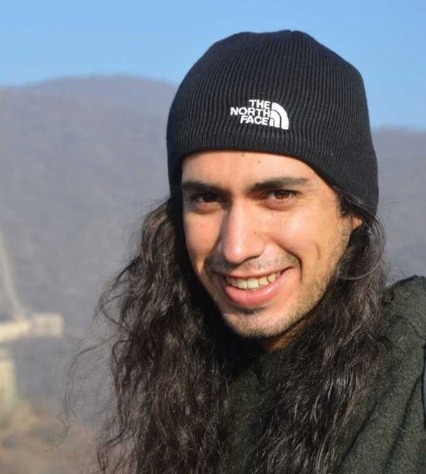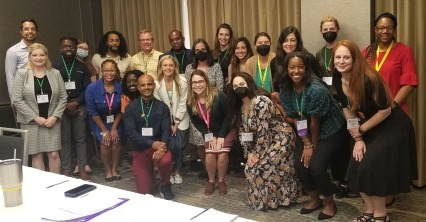Program Contact: Yohansa Fernández, Ph.D.
The Office of Research Training, Diversity, and Disparities (ORTDD) at the National Institute on Drug Abuse (NIDA) is accepting applications for the NIDA Diversity Scholars Travel Award Program to help defray the costs of in-person attendance to national scientific conferences. Travel award recipients will receive an award in the amount of $1500 for round trip meeting travel, lodging, and/or registration.
The NIDA ORTDD will provide travel awards to the following 2025 scientific conferences:
- College on Problems of Drug Dependence (CPDD) on June 14, 2025 – June 18, 2025
*Deadline to apply: March 26, 2025 11:59pm PT - American Psychological Association (APA) on August 7, 2025 – August 9, 2025
*Deadline to apply: May 26, 2025 11:59pm PT - Society for Neuroscience (SfN) on November 15, 2025 – November 19, 2025
*Deadline to apply: September 3, 2025 11:59pm PT - National Hispanic Science Network (NHSN) *TBD*
- Society for Research on Nicotine and Tobacco (SRNT) on March 4, 2026 – March 5, 2026
*Deadline to apply: December 21, 2025 11:59pm PT
*Please note that deadlines are tentative and subject to change.

Eligibility Criteria
- Must be a student (undergraduate, graduate, medical or other allied health professional), post-doctoral fellow, medical resident, or an early-stage investigator (ESI) (see ESI definition) with a full-time appointment. Individuals from an HBCU, TCU, or R2 institution are strongly encouraged to apply.
- Must be a citizen or a non-citizen national of the United States, or have been lawfully admitted for permanent residence (i.e., possess a currently valid Permanent Resident Card USCIS Form I-551, or other legal verification of such status)
- Must have submitted an abstract to conference as a primary author
- Must have not already received a NIDA Office of Research Training, Diversity, and Disparities travel award during the current calendar year
Application Components
The Diversity Scholars Travel Award Program online application form is now open.
Each application requires:
- An online application form;
- A resume or curriculum vitae including most recent publications;
- The submitted conference abstract and submission ID number; and
- A personal statement addressing the following: 1) How will attending this conference advance your career goals? 2) How do your career goals align with NIDA’s 2022-2026 priority scientific areas 3) How do your contributions to research reflect the inclusion of diverse perspectives in the research enterprise?
Selection & Notification
NIDA seeks to provide awards to individuals from various career stages whose meeting attendance will advance their NIDA-relevant program of research (see NIDA’s Strategic Plan). Applicants will be notified of the award decision no less than 45 days prior to the meeting.
For additional information or questions, please contact Dr. Yohansa Fernández at Yohansa.Fernandez@nih.gov.
Testimonials
ORTDD is thrilled to introduce two NIDA Diversity Scholars Travel Awardees, Emmanuel Alvarez, PhD candidate in Neuroscience and a NIDA F31-diversity fellow at Robert Wood Johnson Medical School and Troy Dildine, Postdoctoral Scholar at Stanford University. Both Emmanuel and Troy presented at the 2023 Society for Neuroscience (SfN) conference and share their experiences below!
Please share a little about yourself and your upbringing (if you're comfortable doing so), your educational background, research focus, and career goal(s).

Emmanuel: Before moving to New Jersey, I was born and raised in Tampa, Florida to Puerto Rican parents. My childhood was filled with rice and beans for every meal, scorching summers, and corralling my 3 younger siblings. While I didn’t grow up in the best of circumstances, my parents always did their best and pushed my siblings and me to get our education.
To further my studies, in high school, I applied and was awarded a Gates Millenium Scholarship, a prestigious award aimed to increase representation of minority students across academic disciplines. With this award, I went on to complete my bachelor’s degree in psychology with minors in biology and neuroscience at Rowan University in 2019, where I was fortunate to begin my research training on day one of my freshman year in the Schizophrenia Spectrum Lab, under the direction of Dr. Thomas Dinzeo.
I’m currently a PhD candidate in Neuroscience and a NIDA F31-diversity fellow at Robert Wood Johnson Medical School and member of the Addiction & Decision Neuroscience lab, under the supervision of Dr. Anna Konova. My dissertation research focuses on the cognitive and neural mechanisms that give rise to maladaptive health and addictive behavior. Specifically, I am interested in how individuals with substance use disorder incorporate better-than-expected relative to worse-than-expected information about the potential consequences of their drug use into their beliefs. Additionally, I am interested whether putative biases in this belief updating process are domain-specific and maintained over time in daily life, and what neural processes allow for the emergence of these biases.
I ultimately aspire to be an independent translational addiction neuroscientist investigating cognitive biases that give rise to addictive behaviors. As an addiction neuroscientist, I aim to leverage interdisciplinary tools to test the behavioral and neural processes, and real-world contextual factors, that underlie and perpetuate risky drug use, to inform biological and just-in-time interventions.

Troy: I started my research career in social neuroscience at Dartmouth College, assessing stereotypes and sociocultural biases in behavior. I then had the opportunity to shadow a neurologist at UCSF and gained clinical experiences across multiple clinic types. During my time, I observed several varied patient-doctor interactions and realized the importance of language and culture in medical decision making and the synchrony achieved between patients and providers. With this knowledge, I sought health-related research opportunities and completed a post-baccalaureate at the NIH. I gained expertise in experimental paradigms in pain which prepared me for the transition into my PhD program between the NIH and Karolinska Institute to study disparities in pain experience and assessment. With mentorship from Drs. Lauren Atlas and Andreas Olsson, I assessed the potential role of nonverbal behaviors (e.g., facial expressions) in pain expression and pain assessment. Following my time at the NIH, I started a postdoctoral fellowship at Stanford University School of Medicine within the Pain Division with Dr. Sean Mackey to transition my work from acute pain models to models of chronic pain. It is here that I have looked at stigma related to chronic pain and opioid-use disorders and potential sociocultural biases in non-pharmacological treatment options for pain. I am currently working on career development grant applications with the hope of becoming a faculty member assessing pain and health equity.
At what point in your life did you know you wanted to become a scientist? What drew you to the STEM field and particularly substance use/addiction research?
Emmanuel: For as long as I could remember, I’ve wanted to be a scientist; it was only a matter of what type of scientist. My trajectory became a little clearer when I was about 13. At the time, my mom went back to school to finish her bachelor’s degree. Part of her general education requirements included a psychology course, so she kept a psychology textbook in the house. I decided to read it and was immediately drawn to the study of human behavior, reading the book cover to cover. My love for psychology was further refined by taking AP Psychology in high school where I learned and fell in love with the neural mechanisms of behavior. Ultimately, I went to Rowan University to major in psychology with a minor in neuroscience and joined a schizophrenia-spectrum lab. There I studied changes in reward sensitivity using EEG, which fueled my passion to understand value processing in substance use disorder using fMRI.
Troy: Although being a scientist was not a career that I was cognizant of growing up in rural California, it quickly became of interest while I was an undergraduate. I began my collegiate career as a government major with aspirations for law and public policy; but I quickly deemed the partisan-heavy spaces were not for me. I transitioned to a neuroscience major at that point and fell in love with the coursework. I was drawn to the field to better understand neurological and neurodegenerative diseases and stayed with a particular interest in better understanding the cognitive factors and psychology that influence our everyday decisions. As I moved into research on pain, I began to be very interested in expectations and how sociocultural factors impact pain outcomes. From this angle, I became interested in substance use disorders: what factors are related to SUD risk, how do individuals deal with stigma and social influences in their pain and pain treatment, and finally how do individuals cope with the negative expectations that often coexist during tapering or pain-related substance use elimination.
How did you learn about the NIDA Diversity Scholars Travel Award program?
Emmanuel: I have had the privilege to be a fellow for two NIDA-sponsored training programs: the R25 Translational Research Training in Addictions for Underrepresented Groups program and the Rutgers T32 Training Addiction Research Program. My mentors in these respective programs urged me to apply for the travel award program as I was preparing my nanosymposium talk for SfN. I am thrilled to have been a part of these programs as they supported my training.
Troy: My current supervisor, Dr. Sean Mackey, forwarded information for the NIDA Diversity Scholars Travel award program and always offered his support in my research and submission for the award.
What was your experience like at the SfN conference? What did you gain from attending and how has this impacted your career and professional development?
Emmanuel: This was my first time attending SFN. While many have told me about the sheer size of SfN, when I walked into the poster session the first time, I was both overwhelmed and amazed. There was so much to see and learn! I was also stoked about getting the chance to present my work as a part of a nanosymposium on the neural mechanisms of decision-making. I felt like I was finally making it as a neuroscientist. Getting to showcase my work among leading addiction neuroscientists at SfN was incredibly important as I seek out postdoctoral opportunities. The number of connections I made, and research I was exposed to, gives me a lot to think about as I gear towards the next steps in my training.
Troy: I had a wonderful time attending the 2023 SfN conference. I received lots of wonderful feedback during my presentation that I was able to use to enhance my project and manuscript preparations. Furthermore, I was particularly excited to connect with other awardees during the conference. It was wonderful to hear about others’ experiences in the substance use space and to provide guidance for other awardees earlier in their career trajectory.
What networking opportunities presented while you attended/presented at SfN?
Emmanuel: There were plenty of mixers! One mixer in particular comes to mind, the Decision Neuroscience Social. It was awesome getting to talk to the researchers that I knew by their papers. Another event, and I say this without bias, was the meet-up with the other NIDA travel awardees and NIDA administrators. I still talk to some of the scholars on a regular basis and keep up with their research.
Troy: I was able to have several 1:1 meetings with leading pain scientists during the conference, meet with members from NIDA to discuss my research interests, and to attend SIG meetings to interact with potential collaborators and mentors in a less formal capacity.
What was the biggest takeaway from the conference?
Emmanuel: The conference reminds me of the story of the blind men and the elephant. This group of men come across an elephant for the first time. Each man identified a different part of the elephant but never came to a consensus of what they just found. SfN gives us the chance to combine our knowledge from the smallest molecule to the most complex behaviors to understand the nervous system. It is exciting and humbling to be a part of this field.
Troy: One of my biggest take-aways from the conference was the importance of being able to connect with other researchers in-person and how wonderful it can be to be surrounded by similar and inquisitive minds. Conferences like SfN can be such a creative space, where lots of intense focus is given to one’s own research and in connecting with others!
What would you advise to early career scholars attending a conference for the first time?
Emmanuel: I would say make a plan of what posters and talks you want to see before you get to the conference. This list will help ground you as you navigate the sea of symposia. Another tip I'd offer - connect with a buddy to act as an experienced guide. Lastly, just talk to people. That is what everyone is there to do: to talk about science. It’s scary at first, but after time, you’ll find it easier and easier. With the people you meet, you’ll be surprised how often you’ll see them at another conference.
Troy: It doesn’t hurt to reach out to researchers that you would like to connect with during the conference! Not everyone will have availability but having the opportunity to connect 1:1 can be really meaningful. Furthermore, don’t get too overwhelmed by the number of talks and activities available during the conference. There can be a lot of internal pressure to attend every talk and see every poster, but as a multi-day event it is OK to consider the conference as more of a marathon. It is great to prioritize certain events but try not to apply self-judgment if you are to miss something!
Please share anything else you would like with the research training community.
Emmanuel: Becoming a scientist has been a challenging, and hard-earned experience. I am incredibly grateful for opportunities that I received through NIDA-sponsored training program and the mentors I have had the privilege to learn from. The mentorship I received, I believe, has given me a fighting chance at success in the field and will allow me to eventually inspire others to become scientists.
Troy: The awardee meetup was a wonderful time to connect with both members from the NIDA community and other early career researchers interested in substance use disorders. I brought up during the meetup a want for creating an email list or some form of longer-term connection between the awardees. I didn’t see any follow-up on this front since the conference, but I could see its potential benefit for future iterations.

